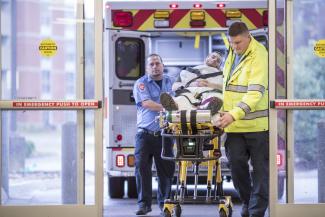The University of Tennessee Medical Center to participate in clinical trial with the University of Pittsburgh to study whole blood in trauma patients.
KNOXVILLE, TENN. (Nov. 3, 2022) – Researchers at The University of Tennessee Medical Center (UTMC) are teaming with researchers at the University of Pittsburgh to conduct the TOWAR clinical trial with UT LIFESTAR trauma patients.
According to Brian Daley, MD, Professor and Chief of the Division of Trauma and Critical Care and Program director in Surgery at UTMC, the trial is intended to improve trauma patient outcomes and survival rates by studying Type O whole blood and age during prehospital resuscitation. Daley is the physician leading the TOWAR trial efforts at the medical center.
“Theoretically, giving whole blood to trauma patients while they are in an ambulance or emergency medical flight on the way to the hospital will improve patient results because whole blood has not separated into its individual parts, such as red blood cells or plasma,” said Daley.
Daley explains this type of research is not new to UTMC, the region’s ACS-verified Level I trauma center, or to UT LIFESTAR. Both organizations previously performed a similar project with plasma called PAMPer, and what was learned during that project was a key factor in changing the way trauma patients are treated. PAMPer’s findings were. reported in the New England Journal of Medicine.
Daley says the purpose of the TOWAR trial is to answer three key questions:
- Does giving trauma patients whole blood in a prehospital environment improve survival outcomes at 30 days when compared to plasma, red blood cells or nothing at all?
- Does the age of whole blood impact patient survival rates?
- Does administering whole blood provide overall benefit to patients upon evaluation and arrival to the hospital?
“When someone donates blood, it typically gets separated into parts such as red cells, plasma, platelets, or other parts for storage, and these parts can be used individually,” said Dr. Jason Sperry, Principal Investigator for the TOWAR trial, Professor of Surgery at the University of Pittsburgh and Trauma Surgeon at the University of Pittsburgh Medical Center. “When someone is bleeding, they’re losing all these parts of blood. Trauma research has shown that if you put all of these parts back together again, whole blood can be beneficial to trauma patients or patients at risk of bleeding.”
Sperry explains the multi-center trial will begin in 2022 and is funded by the U.S. Department of Defense. The findings of the TOWAR study may provide better prehospital trauma care for soldiers injured in the field.
“To have whole blood products out in the field or in remote environments is very difficult because the products are considered expired after a certain point,” said Sperry. “So, we also want to know more about whole blood products shelf life, whether younger versus older whole blood makes a difference, or whether whole blood is safer and more effective for trauma patients.”
Sperry says the results of the TOWAR study have the potential to change the way prehospital trauma care is provided.
“If we can determine that whole blood is safe and effective for trauma patients, we can improve the outcomes of these patients before they even arrive at the hospital,” said Sperry.
The four-year study will use randomly selected trauma patients enrolled from emergency calls, but patients will be able to opt out of the trial in advance by calling 1-800-664-0557 or using the contact form on the LITES website, www.LITESNetwork.org/TOWAR.
This research is supported by the Department of Defense. Any opinions, findings, conclusions, or recommendations expressed in this material are those of the author(s) and do not necessarily reflect the views of the Department of the Army, Department of Defense, or the U.S. Government.
